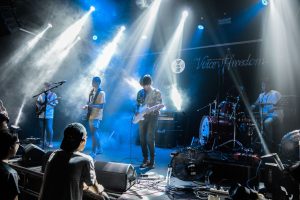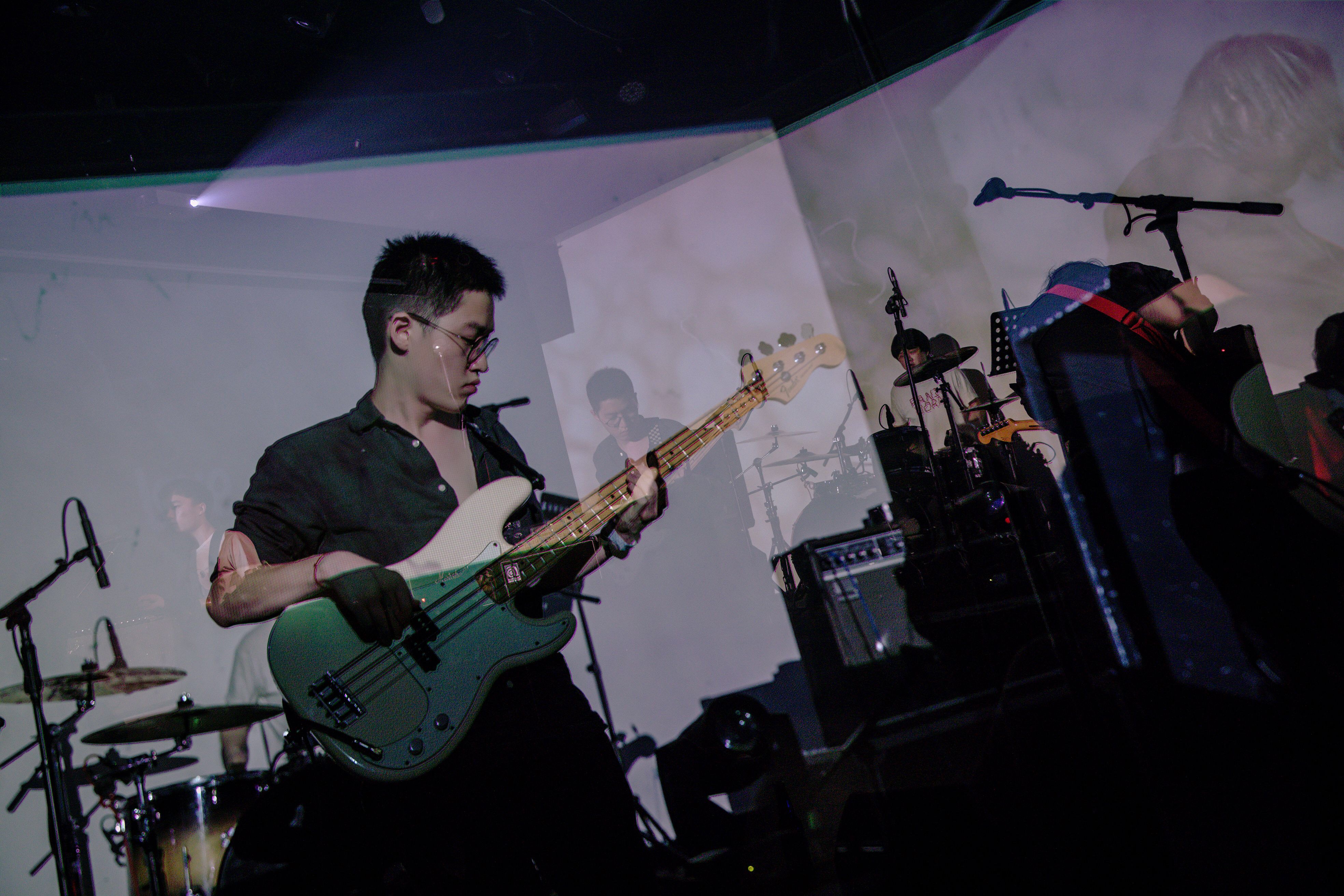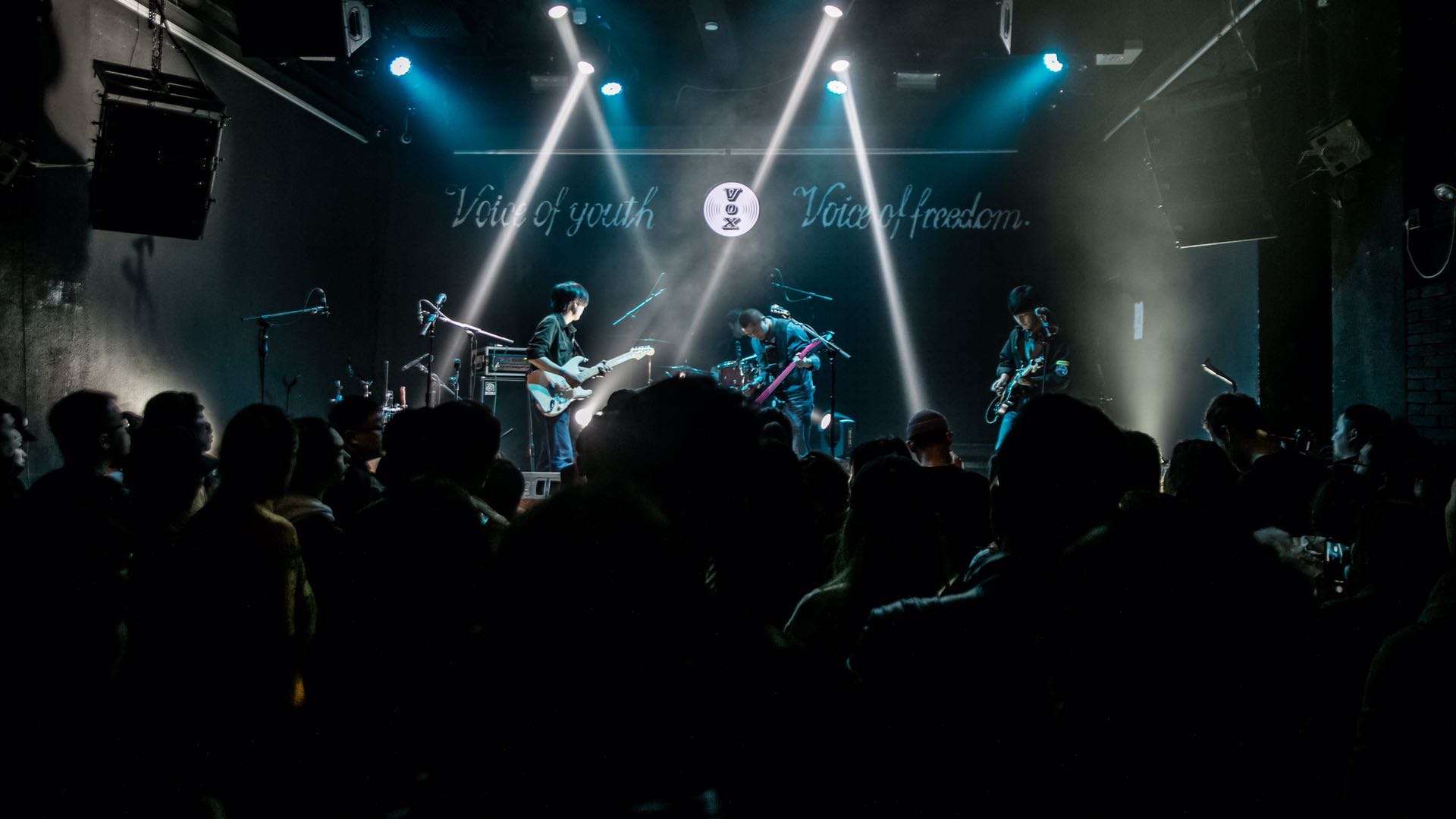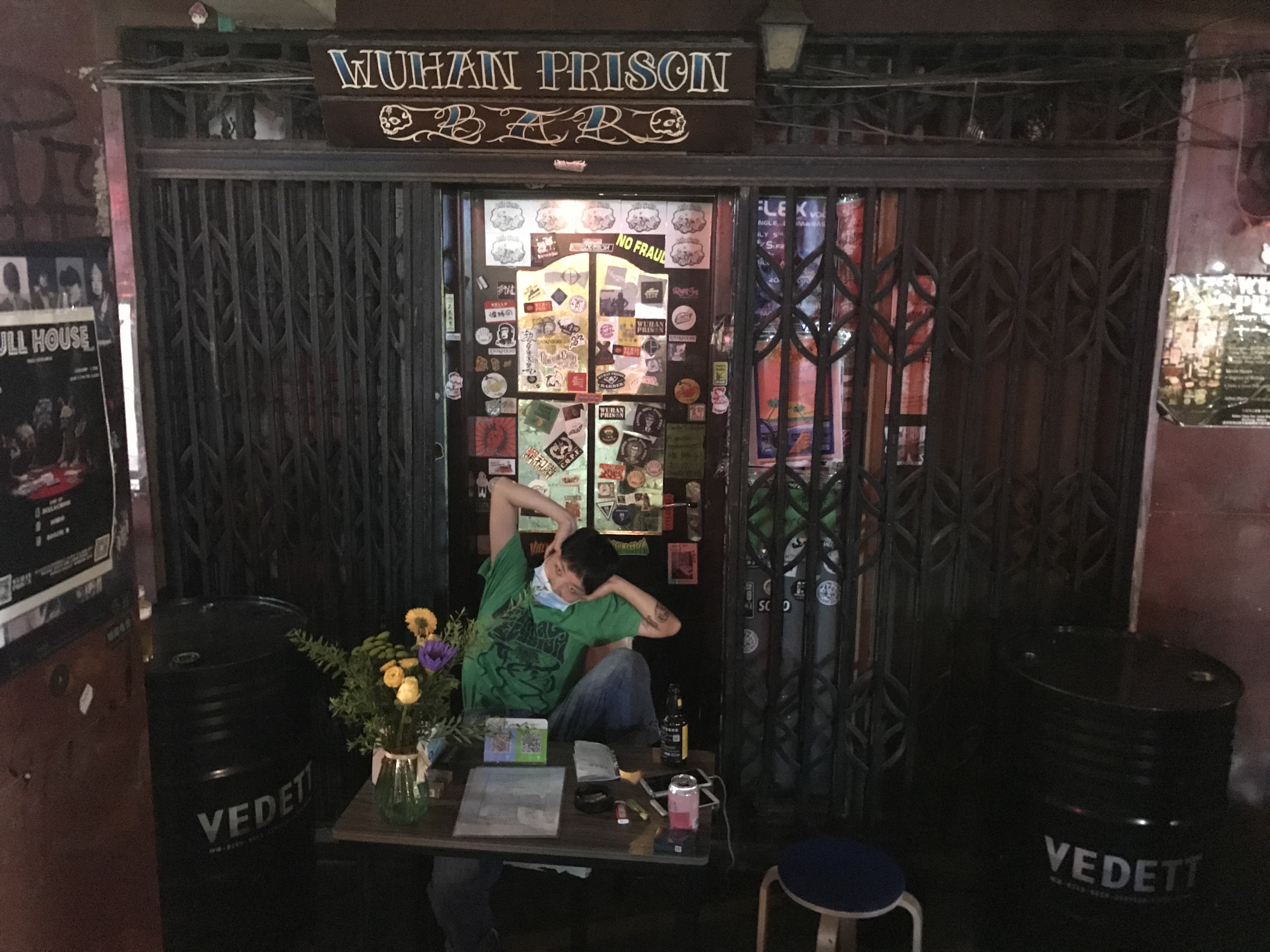Before social distancing, self quarantining, and the city of Wuhan becoming part of everyday discourse worldwide, Li Ke made his living compelling that central Chinese city’s punks to crowd surf and mosh. Those shows have been deemed some of China’s best by music buffs. Wuhan, in turn, is frequently cited as China’s punk rock capital.
Today, the once rowdy Vox live house that Li manages is quiet and all but empty thanks to the citywide lockdown that took hold back in January, when Wuhan became the epicenter of the COVID-19 pandemic. A gradual lifting of restrictions in April slowly brought a semblance of normalcy to the capital of Hubei province, which has had 67,803 officially reported COVID-19 cases and 3,212 deaths. Despite the newfound leniency in some sectors, Li can only permit patrons to drink at Vox’s bar, while the venue’s bombastic, revenue-driving concerts remain banned.
For those patrons swilling beers at the bar, Vox’s motto — “Voice of Youth, Voice of Freedom” — will appear all the more stark from where it is etched on the wall behind the stage. The white letters are trying in vain to fill an empty performance space, falling short of their meaning, and the ethos Vox is renowned for.
Li Ke tells The Diplomat that Vox has lost 100,000 Chinese renminbi (RMB)($14,000) per month due to the lockdown. Among those costs: rent, along with maintaining the salaries of his tech crew, bar manager, and booking manager. These employees are some of the “youth” that Li continues to support throughout this business-busting pandemic. He also keeps them on the payroll for practical reasons, to “make sure we are ready to immediately go back to work” once the current gig prohibition ends.
It all adds up to “a huge total for us,” says Li, “because we’re a small company.”
Such financial hurdles are a “crisis” according to Dong Dong, manager at another local underground venue called Wuhan Prison. In early May, Dong hosted an 11th anniversary party at the bar — which, like Vox, was co-founded by a member of 23-year-old, pioneering local punk band SMZB (frontman Wu Wei was involved in Wuhan Prison’s launch in 2009, while prior drummer Zhu Ning kickstarted Vox in 2005). Dong could do little to celebrate Wuhan Prison’s anniversary this year, only selling drinks and screening music documentaries to avoid the local authorities’ scrutiny. With the amps silent and the stage devoid of its usual rip-roaring performances Wuhan Prison has, as Dong puts it simply and sadly: “lost a lot of money.”
The city’s underground musicians — the “youth” that Vox strives to be “the voice of” — are every bit as cash strapped as the venues barred from letting them perform. Chen is the guitarist for 如梦 (Rú Mèng, roughly translated as “Dreamy”; listen to their music here and here), a rising Wuhan post-punk band newly signed by Maybe Mars, an indie label that also includes SMZB. Chen (who declined to give his full name) says the sudden disappearance of income during the lockdown was exacerbated by the rising cost of essentials like vegetables. Prices on many staples doubled or tripled during the pandemic’s apex in Wuhan.
Meanwhile Li Yuntong — bassist for another new Wuhan post-punk band called Fill Lake and stage manager at Vox live house — says the pandemic affected both her income as a creator and also her habits as a consumer. She was fortunate enough to be staying with her parents for the Chinese New Year holiday as the pandemic hit, and says she is grateful those elders bore the brunt of costs for newly pricey groceries. However, Li would have typically earned 20,000 RMB for managing the stage at Vox over the past six months, if COVID-19 hadn’t forced the venue to swipe its gig slate entirely (she was not among the employees that Li Ke could keep paying throughout the pandemic).
Trying as that may seem, Li Yuntong was all the more frustrated by being forced to quarantine at home with her family, and stay away from Wuhan’s bohemian East Lake neighborhood. The placidity of the lake, homey ambiance of its surrounding businesses, and camaraderie with the abundance of fellow musicians who reside nearby, all inspire Li and her bandmates to plumb depths beyond the reverb heavy playing that has become typical of their genre. The result: soothing melodies, with turbulent guitar riffs undertows (which can be heard here), not to mention artsy videos of the lake that they plan to screen onstage during their future gigs. While marooned with her parents, Li longed to watch the lake’s gentle ripples from one of its onside hole-in-the-wall restaurants that serve Wuhan’s famed “hot dry noodles.” She recalls how “we would walk around the East Lake after every rehearsal, and discuss how we sounded. Being away from there troubled me so much.”
Such cabin fever was a catalyst for Ryan, a British expat who plays guitar in the Wuhan band Panic Worm (and who declined to give his last name). He hunkered down during the lockdown and focused on his ambient side project Slot Canyons. That work flowed more freely than usual because of the newly imposed idle time inherent in quarantine. It was also a welcome distraction from the loneliness Ryan and his bandmates experienced by being separated for months, far longer than the handful of weeks they initially anticipated when parting ways for the Chinese New Year holiday.
“We always like to take any opportunity to play live, so we are all really missing this experience,” he says, before focusing on the upside: “When you’ve been restricted from doing something you’re passionate about it is challenging, so it should give you the motivation to come back stronger. Before you take everything for granted, but now the first show [after the lockdown] will feel like a new experience again.”
Chen has a far more pessimistic take. The Dreamy guitarist bluntly says he had “no desire to write about the pandemic” when asked if quarantining fired up his work ethic or inspired any triumphant new anthems about overcoming adversity. He and his bandmates were instead “so upset about not being able to perform and having to practice at home.” Those hours cooped up inside led Chen and other Dreamy members to be “overwhelmed by a lot of bad news on the internet every day, which made us more depressed. So we could only chat with each other online to relieve the inner pressure.”
Worse still, at least in the view of any musician, was Li Yuntong’s quarantine predicament. That’s because the Fill Lake bassist was unable to pick up her instrument from the studio before the lockdown swept across Wuhan, leaving her stranded at home without means to play music. She worries about being rusty when Fill Lake takes to the stage again. Thankfully, she remains galvanized by harrowing news footage of Wuhan’s selfless frontline medical staff. She and her bandmates, in fact, pledged to donate proceeds from their upcoming concerts to those “heroes who fought the virus.” The thought of returning to Vox’s stage post pandemic and raising funds for brave nurses offers some consolation as she wiles long hours away, waiting for the restrictions on live music to lift.
Mounting financial pressures left Li Ke and his Vox colleagues without the luxury of waiting. In order to be proactive in the midst of a revenue-halting lockdown, Li began live streaming performances at Vox. He started doing so during the height of those restrictions in Wuhan, months before the pandemic spread and such online gigs became par for the course throughout China, not to mention Western artists following suit on platforms like Instagram Live. The financial potential for live streaming may seem especially promising in China. After all, ubiquitous use of online payment methods like Alipay and WeChat, and their seamless integration with live streaming, allow viewers to send digital “gifts” that performers, influencers, or organizers can withdraw into their bank accounts.
Lauren Hallanan is the head of marketing at Chatly, and is also a social media marketing expert. She attributes Chinese live streaming’s money-making potential in part to the unique habits of its users. “A lot of Chinese people live in big cities by themselves, or have roommates they might not be close to. These users tend to spend a lot of time alone, or time commuting, even pre-COVID-19,” she says. As a remedy, Hallanan says such users turn to live streaming “to interact with other people and get a sense of socializing without going out.”
Promising as that might sound for quarantining musicians, SUBS singer Kang Mao says independent bands and underground venues have little to gain from live streaming. Mao is a Wuhan native who moved to Beijing in the late 1990s, and went on to earn one of the Chinese underground’s biggest ever followings with her SUBS bandmates, thanks in no small part to her glass-shard sharp vocals. A SUBS live stream at the pandemic’s outset attracted 30,000 viewers and raised considerable funds. However, Mao says that impressive sum can’t replace regular gig revenue, because the audience “knew we’d donate all the proceeds of that performance to Wuhan. I don’t think it’s a reliable source of income for bands, like it is for online celebrities.”
Meanwhile, the live stream that Li Ke coordinated for Vox’s 15th anniversary during the pandemic fell far short of SUBS’ benchmark. Vox raised a mere 76 RMB from 10,000 viewers or, as he calls it, “practically nothing.” However, he says the bands who participated thankfully performed free of charge, leaving him to summarize such live streaming as only “a good way for artists to maintain a connection with their fans.”
Other Chinese musicians have, however, made a fortune from live streaming according to Hallanan (who wrote about the topic for Forbes last year). And yet, star live streamers not only have far wider appeal than typical underground rockers catering to discerning audiences — they also provide exactly what the medium’s slew of lonely users are craving. Successful live streaming musicians “take breaks between songs to interact” with the users commenting on the performance, says Hallanan. “Simply setting up a camera and playing your songs won’t get you a lot of ‘gifts’ from viewers who want an interactive experience.”
Despite such income supplementing possibilities, Li Yuntong and her fellow Fill Lake members refuse to partake in live streaming at all, let alone alter their performance style to suit its users. Li says she and her bandmates instead “prefer to communicate with the audience in close proximity rather than across a screen, which I personally feel is quite unnatural.”
SMZB frontman Wu Wei tries to offer a more nuanced take. He feels that live streaming may be the only option, for now, for both bands and fans. It should come as no surprise, however, that the idea of striving for e-pay “gifts” from emoji-fixated viewers doesn’t seem very “punk rock” to a hardcore, 23-years-and-counting veteran like him. He says: “It doesn’t matter much to me, and I wouldn’t really fit its mood.”
Some of Wu’s label mates at Maybe Mars, however, found success putting on one of China’s biggest underground rock live streams in mid-May. Viewers donated a total of 40,050 RMB through mobile pay while watching those Maybe Mars sets, according to label director of operations Lolly Fan, a total dwarfing Vox’s anniversary gross.
Having a headliner like Carsick Cars, arguably Beijing’s biggest-ever underground band, certainly didn’t hurt Maybe Mars during that endeavor. The veteran power pop rockers sent the scrolling comment section of the live stream’s screen into a frenzy during their pogo worthy classic “Mogu” (the Chinese word for mushroom). Then there was “Zhong Nan Hai,” their peppy ode to the tobacco company of the same name, prompting viewers to send slews of cigarette emojis across the screen. That warm reception, along with the above average cashflow for a live stream, may have impressed many at the label.
However, operations director Fan is quick to admit that a regular in-person concert usually grosses far more. In her view live streaming’s “biggest benefit certainly is the exposure, as well as the interaction and connection with the fans.” Regardless, she adds: “It’s important to let people see we’re still trying our best to make everything work, to keep things going.”
Yes, music industry hub Beijing had a more profitable, bigger-buzzed, and more slickly produced underground rock live stream during the ongoing pandemic. But Wuhan’s music scene arguably has a greater advantage as the effects of COVID-19 persist. The smaller city’s lower operating costs have helped Vox and Wuhan Prison remain open despite having to contend with a lockdown months before their counterparts in any other Chinese locale. Meanwhile, venues like DDC, a beloved live house in Beijing’s aged hutong alleys, closed in late May. The owner of Caravan, another Beijing venue known for offbeat open mic nights and even stranger avant-garde showcases, despaired about his business being “done in by f*cking corona” back in February. Hong Kong venue Hidden Agenda closed in March due to COVID-19 related issues, while Shanghai hip-hop haven Arkham shut down in May.
However, local music fans are by no means surprised by Wuhan Prison and Vox’s resiliency, even as their big-city cohorts stumble. After all, Wuhan has long been known as the the criminally overlooked hub for both China’s most authentic punk music and the nation’s ruthlessly toughest acts, even as Beijing and Shanghai’s scenes hogged much of the limelight. Over the years, throngs of Western journalists have fixated on Beijing bands defying modern China’s considerable careerist and consumerist pressures. Occasionally, more astute expat writers realize the capital’s current bands, like Carsick Cars, have shrunk away from the overt rebelliousness characterizing a rock boom that followed the Tiananmen massacre. All the while, SMZB has reigned supreme in Wuhan since 1996 with brawny anthems decrying local corruption and oppression.
Archie Hamilton is the co-founder of Split Works, which brought foreign acts like Dandi Wind to Wuhan as early as 2009. Straight away, Wuhan struck him as “a classic punk city. A working class steel town, heavily polluted, almost more than anywhere I’d been in China before, and quite nihilistic and dystopian in terms of how it felt as a city. And the music reflected that.”
That is certainly the case for Wuhan’s visceral young acts like Panic Worm and Dreamy, and arguably more so for the city’s punk founders. If their names didn’t prove it — monikers ranging from Angry Dog Eyes to Day of Chaos and even Dogsh*t Sandwich — then their deeds certainly sealed their notoriety.
Take SMZB frontman Wu Wei. Fellow musicians look up to him as an underground elder statesman. After all, when he founded the band, there were precious few punk outfits throughout China, and fewer still in Wuhan. In the ensuing years he and the rest of SMZB remained vital, crafting driving, Pogues-esque tracks with infectious rhythms across 10 albums. Lolly Fan at SMZB’s label, Maybe Mars says: “As a 23-year-old band, SMZB is still active and releases new albums regularly. [Frontman] Wu Wei never changes his thoughts or his mind. He is as sharp as ever.”
Onstage, Wu brays like an untamed beast. He also frequently dons poor boy caps along with muscle shirts that leave his myriad of arm tattoos visible. Offstage, he engages in the time honored local punk practice of 裸奔 (luoben) or running naked in the streets in the wee hours of the morning. It’s a goofy and reckless habit that irks more conservative Wuhan natives to no end (not to mention the local police, who try to chase those nude punks down in the midst of that act).
Aside from all that, Wu is very soft spoken in conversation. He is described as “kind, humble, and persistent” by Fan, who is equally complimentary of his songwriting, saying, “He fights with his black humor and touching lyrics.”
Some fans might instead describe the band’s lyrics as a rallying cry. Case in point: their song “Wuhan Prison”:
I am living in the city, with my family
We can’t feel freedom and safety
We feel like [we’re] in a prison
I want to leave this hell, but can’t find a way
So many fucking rules, but I don’t care
Riot, riot this city…
Such bold and brazen lyrics have left lasting impressions on younger generations of Wuhan musicians. Chen, from the aforementioned band Dreamy, calls SMZB “one of my favorite bands” because “they were brave enough to write many true songs.” Meanwhile Chun Lei, a Chinese guitarist and bandmate of the British expat Ryan in the up-and-coming Wuhan band Panic Worm, recalls how “When I first came to Wuhan to study, SMZB’s songs gave me strength.”
Such praise reverberates through generations of Chinese alt-rock. Take Yang Haisong, the frontman of P.K.14, a post-punk band that Yang co-founded in Nanjing in 1997, shortly after SMZB formed in Wuhan. Yang sees SMZB as his cohorts in a very special class of subversion. “Back in the ‘90s, almost all the Chinese underground bands were like that,” Yang says of SMZB’s old school transgressiveness. He adds: “Wuhan punks were part of that movement.” The P.K.14 frontman (whose band is now label mates with SMZB on Maybe Mars) goes on to praise Wu Wei and co.’s first album, 生命之饼* = B Of Life for viscerally capturing the blast furnace atmosphere of their downtrodden hometown, before calling SMZB “one of the best of Wuhan’s, and all of China’s, punk bands.”
Now over two decades into their career, SMZB still hasn’t lost its edge. Wu says the band plans to release its new album, ONCE UPON A TIME IN THE EAST, in June, and one of its songs will be dedicated to protesters famously defying the Chinese Communist Party in Hong Kong (Wu Wei has even greater cause to support those protesters now, given recent plans for national security legislation decried in the West as a means of oppressing the former British colony).
Despite such subject matter seeming fearless in this era of ever increasing crackdowns on dissent in China, Wu tells The Diplomat with practical nonchalance: “I don’t think my lyrics are controversial or rebellious. I think they are all lyrics that a normal person would say or sing. So why should I be proud of these normal lyrics, or think that I broke any new ground?
Music aside, onlookers would be hard pressed to call Wu Wei anything less than a dissident. For instance: he was a signatory of the famed human rights manifesto Charter 08, which garnered a Nobel Prize for author Liu Xiaobo, not to mention a prison term. Wu’s punishment was milder, but still ominous: his phone was tapped by officials.
In 2010, Wu teamed with other local artists to advocate for musicians threatened by gentrification. An impassioned article about Wuhan’s music scene in the arts and culture publication Radii describes how Wu and fellow Wuhan underground musician Mai Dian tried to resist the expropriation of Donghu, the East Lake neighborhood where Li Yuntong and numerous other local musicians continue to loiter and dwell. For their efforts, Wu, Mai, and the others “were harassed by the local authorities. Mai Dian continued the good fight by organizing talks about Donghu and forming an art collective to document the real estate development.”
Such stories of resilience are in keeping with Wuhan’s age-old reputation as China’s toughest town. Long predating the proliferation of its rugged punks, a number of Wuhan locals took up arms in 1911 against imperial officials. The Xinhai Revolution came next, leading to the downfall of China’s last Imperial Dynasty. To this day, many Wuhan punks and other underground musicians claim that the Xinhai rebelliousness still reverberates throughout their scene.
As Lucas, the guitarist for Wuhan ska/reggae band Sky King Jack, puts it: “Wuhan is the birthplace of the revolution that overthrew China’s thousands year old feudal system.” He then traces that tumultuous history to the present day: “Wuhan people have the characteristics of ‘punk’ deep in their personality. Our tempers are hotter than our fellow Chinese. And anything we don’t like, we will resist.”
That penchant for rebellion is still apparent for rising Wuhan artists like Chen from Dreamy. Speaking like a true successor of the trailblazing Wu Wei, Chen plainly calls local officials “bad people” because of their delayed warnings of the pandemic to the public. He adds: “This kind of thing is very common. When something goes wrong, officials like to keep it a secret because they are afraid of taking responsibility and affecting their positions.”
Wu concurs, saying “the Wuhan government did a terrible job” at the pandemic’s outset. However, the SMZB frontman was quick to praise frontline workers, “especially those medical staff, as well as various volunteers and civic organizations. They have made great contributions.”
Given Wuhan’s history of tumult and tenacity, it would seem that COVID-19 and the commerce-killing lockdowns left in its wake have met their match in the city’s scrappy musicians and resourceful venue operators, at least in Archie Hamilton’s view. The founder of Split Works recalls attending shows at venues like Vox that “had the atmosphere like in the north of England, these factory and mining towns, where people are quite rough and tough and full of reckless abandon. There’s lots of substance abuse, but lots of really true speaking and true living collectives in Wuhan. It has a spirit of freedom that I didn’t find in a lot of other Chinese cities.”
While some of those characteristics made Wuhan challenging to coordinate gigs in, Hamilton prefers to focus on how it is one of the “friendliest and freest speaking cities in China, and my favorite to go gig at. I know they’ve been having really tough issues like the rest of the world during this period. But if anyone is able to weather this storm, it’s the people of Wuhan.”
SUBS singer Kang Mao, meanwhile, has a more cynical take, though it’s not lacking a silver lining: “Most musicians’ income in China has never been good anyway. There’s no question that the people in Wuhan are particularly resilient. And as long as Wuhan’s musicians have the love of performing, no disaster will separate them from their music.”
Meanwhile Li Yuntong, the bassist for Fill Lake, weighs in with an earnestness akin to the band’s music, saying: “Even if they can’t perform, the bands in Wuhan are still preparing for their future development step by step, They are all very creative and I believe the music scene in Wuhan will be full of vitality again!”
Her upbeat take is heartening for more seasoned music scenesters like Li Ke from Vox. Even as the financial hurdles mount for his live house, he still believes that “as long as there are talented people who love music, I think Wuhan’s music scene will get better.”
“After all,” Li Ke adds: “Music is not the music industry.”
Larry Mullin is a reporter based in China.




































